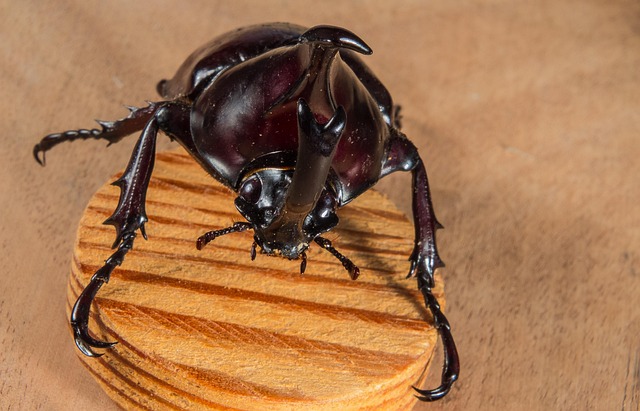Grain beetles in homes cause damage by breeding quickly in organic materials. Infestations start with small cracks, leading to holes in packaging and a musty smell. Preventative measures include cleaning, sealing entry points, and proper food storage. Regular maintenance and professional treatments protect homes from beetle damage, preserve food quality, and enhance property value. A multi-faceted approach using IPM and eco-friendly methods minimizes reinfestation risk through strict hygiene and environmental changes.
“Maintain a beetle-free haven with our comprehensive guide to residential grain beetle treatment. Explore the ins and outs of these persistent pests and discover why regular maintenance programs are key to long-term protection. From understanding infestations to implementing effective control measures, we break down the essential components for successful beetle prevention. Learn about strategic, long-term strategies to safeguard your space against reinfestation and secure a peaceful, pest-free environment.”
Understanding Residential Grain Beetle Infestations
In residential settings, grain beetles can cause significant damage if left unchecked. These tiny insects are attracted to stored grains and other organic materials, making homes with pantries or food storage areas particularly vulnerable. Understanding their behavior is the first step towards effective residential grain beetle treatment. Grain beetles typically enter through small cracks or openings in walls, floors, and ceilings, targeting places where moisture meets organic compounds. They breed rapidly, with female beetles laying eggs in crevices and behind walls, leading to infestations that can be hard to eradicate without professional help.
Early signs of a grain beetle infestation include the presence of small holes in packaging, visible beetles, or a musty odor. To prevent or address these issues, regular maintenance is crucial. This involves keeping all food storage areas clean and dry, sealing entry points, and promptly disposing of any infested items. Professional residential grain beetle treatment may involve targeted pest control methods tailored to the specific extent of the infestation, ensuring long-term protection for homes.
Benefits of Regular Maintenance Programs
Regular maintenance programs offer numerous advantages when it comes to preventing and managing insect infestations, particularly in residential areas. One of the key benefits is the prevention of costly damage. Insects like the residential grain beetle can cause significant destruction to homes by infesting stored food products, which may lead to spoilage and require expensive repairs or replacements. By implementing scheduled treatments and inspections, these programs help identify and mitigate potential issues before they escalate.
Moreover, regular maintenance promotes a healthier living environment. Effective grain beetle treatment methods ensure that these pests do not pose risks to residents’ well-being, especially those with allergies or sensitive skin. Such programs also contribute to the preservation of properties’ value by maintaining their integrity and aesthetic appeal, preventing any long-term damage caused by insect activity.
Key Components of Effective Beetle Control
Effective beetle control in residential spaces, especially focusing on grain beetles, involves several key components. One crucial aspect is regular inspections and maintenance. Homeowners and property managers should conduct routine checks for any signs of beetle infestation, such as damage to stored products or the presence of live insects. Early detection allows for swift action, preventing small issues from escalating into large-scale problems.
Another vital component is implementing integrated pest management (IPM) strategies. This involves a combination of methods, including sanitizing and sealing entry points, removing potential food sources, and using targeted treatments if necessary. Professional residential grain beetle treatment often employs eco-friendly solutions to minimize environmental impact while ensuring effective control. Regular vacuuming, proper storage practices, and maintaining good hygiene contribute significantly to long-term beetle prevention.
Long-term Strategies for Preventing Reinfestation
To ensure long-term protection against residential grain beetle reinfestation, implementing comprehensive prevention strategies is key. This involves a combination of strict hygiene practices and environmental modifications. Regular cleaning routines, focusing on thorough vacuuming and laundering, are essential to remove any potential beetle harborage sites or food sources. Additionally, sealing entry points like cracks and gaps in walls or windowsills with appropriate sealants can prevent new infestations.
Storage practices play a significant role as well. Items like grains, pet foods, and nuts should be kept in airtight containers made of non-porous materials. Proper ventilation in storage areas helps deter beetles by reducing moisture levels that are attractive to these pests. Regularly inspecting and maintaining these measures will create an inhospitable environment for residential grain beetles, significantly reducing the risk of reinfestation.
Ongoing maintenance programs, incorporating regular inspections, sealing entry points, and proactive cleaning, are key to effective residential grain beetle treatment. By understanding the life cycle of these pests and implementing targeted strategies, homeowners can prevent infestations and protect their properties from these persistent intruders. Investing in long-term solutions, such as storage practices that discourage beetles and the use of natural repellents, ensures a beetle-free environment and provides peace of mind.
